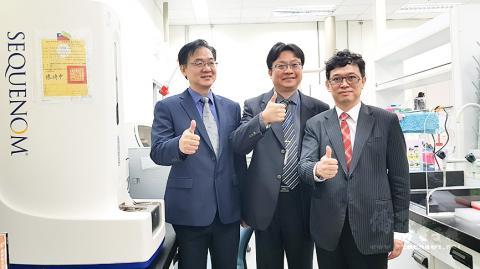
National Taiwan University’s (NTU) pharmacogenomics laboratory has provided genetic testing to more than one-third of lung cancer patients receiving targeted treatment and generated revenue of nearly NT$400 million (US$13.11 million) over the past eight years, NTU medical biotechnology professor Yu Sung-liang (俞松良) said yesterday.
The NTU Department of Clinical Laboratory Sciences and Medical Biotechnology in 2011 established the laboratory to promote precision medicine and has since received about NT$500 million from the Ministry of Science and Technology, Yu told a news conference at the department in Taipei, where he lauded his team’s achievements over the past years.
The laboratory and Academia Sinica in 2017 joined the US-led Cancer Moonshot (now Cancer Breakthroughs) plan to carry out genome sequencing of lung and breast cancers.
Over the past eight years, the laboratory provided genetic testing to more than one-third of lung cancer patients receiving epidermal growth factor receptor (EGFR) target therapy in Taiwan, he said.
It has produced more than 25,000 genetic testing reports for doctors to administer personalized therapies and disease prediction, Yu said.
Previously, people with lung cancer were likely to develop pneumothorax, or collapsed lung, and needed emergency care if physicians collected samples from their lungs, while samples collected from one tumor might be different from another tumor, he said.
To address the problem, the laboratory developed non-invasive testing methods, such as using a patient’s serum samples to screen for tumor DNA, Yu said.
The team is also helping domestic biotech companies to develop related instruments, he added.
Having taken part in the Ministry of Health and Welfare’s cancer screening program since 2014, his team also found that the risk factors for lung cancer patients in Taiwan vary significantly from those in the US and Europe, Yu said.
The laboratory generated service revenue of NT$389 million from 2011 to last year, while it has also attracted business investment up to NT$52 million, he said.
The laboratory in June stopped providing testing service for people undergoing EGFR therapy, as the health ministry in September included it in the National Health Insurance program, he said.